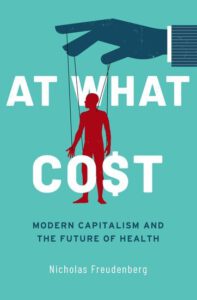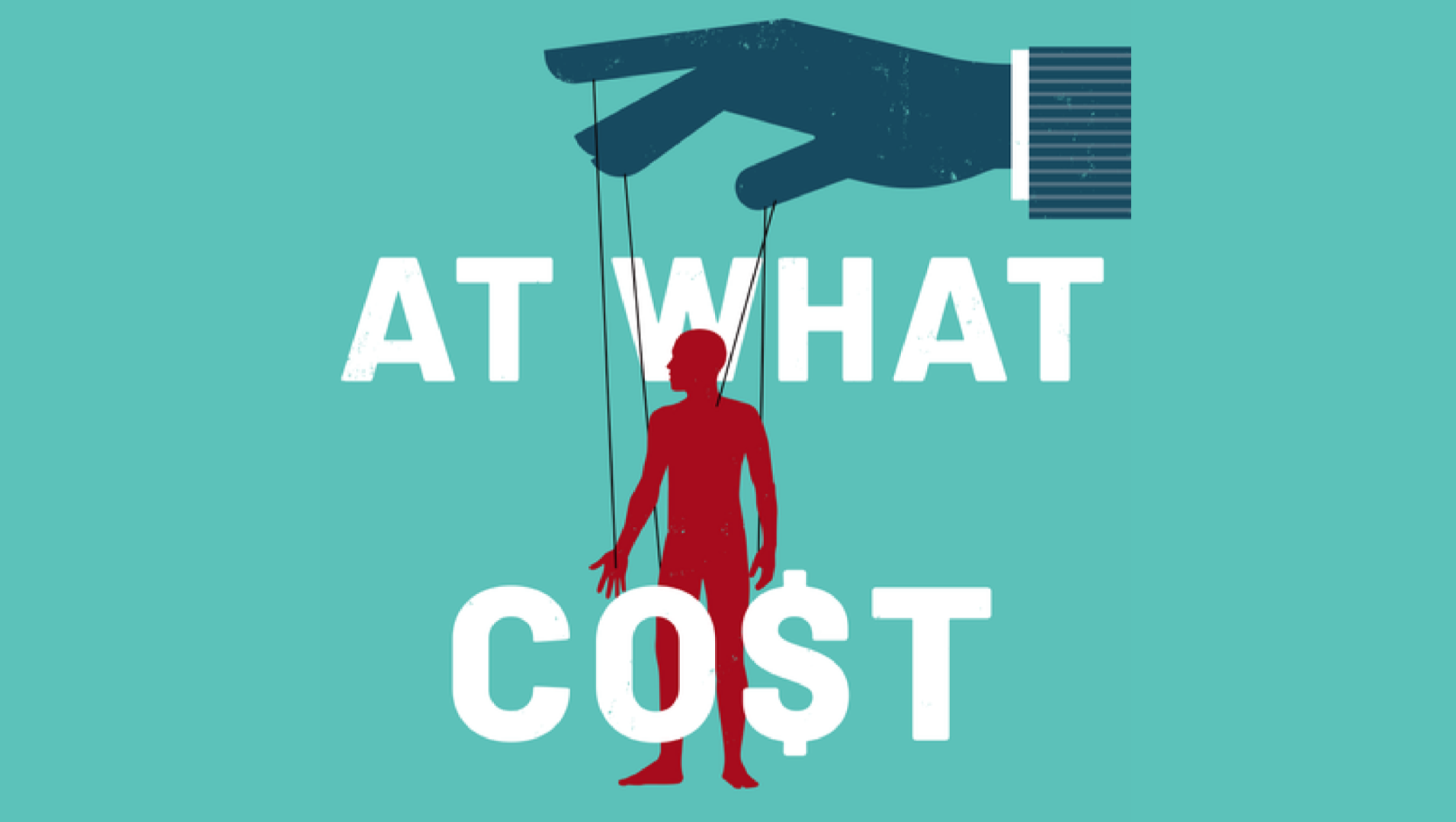
At What Cost Modern Capitalism and the Future of Health, a new book by CUNY Urban Food Policy Institute director Nicholas Freudenberg, describes the challenges that people face in finding the “six pillars of health” – food, education, health care, work, transportation, and social connections. Published by Oxford University Press and released last month, the book analyzes how changes in modern capitalism have complicated the pursuit of well-being and explores local, national, and global efforts to create healthier, more equitable and sustainable alternatives. In this interview, Institute Deputy Director Craig Willingham interviews Freudenberg about the book’s analysis of food and food policy.
Craig Willingham (CW): One of the underlying themes of your book is that to market and sell their products, food and other companies claim they provide their customers with desirable choices, yet this framing often has a negative impact on public health. From a marketing perspective, why do you think it has been so difficult for the public health community to effectively counter this sort of damaging corporate messaging?
Nick Freudenberg (NF): Predatory marketing—marketing unhealthy products to vulnerable populations such as children and young people, older people, Blacks and Latinos –constitutes a core business strategy for industries such as food, alcohol, tobacco, and others. These companies design products that are hyper-appealing, market them aggressively, and make them available ubiquitously. At the same time, they price healthier products out of reach of many populations, make false claims about the health properties of their products, and use their lobbying and campaign contributions to undermine public health protection, even when such policies are supported by a majority of voters. So yes, on this tilted playing field, the food and other industries have often succeeded in limiting consumer choices to those that make them profits. But it was human and institutional decisions that created these unhealthy options and human decisions that can undo them. To my mind, the key question for the future is: who will set the rules for our economy and our society —public interests or private interests?
CW: Your book describes the global rise of ultraprocessed foods and the associated health problems linked to the desire to increase profitability for food companies. But the global food industry has also made food more affordable for millions of people. What arguments would you use to persuade people in low and middle income countries to forgo the promise of cheap and convenient food in favor of healthier options?
NF: A really important question, Craig. And I agree, the global food industry has over the longer term contributed to reducing the number of people suffering from hunger and malnutrition. But the recent dramatic increases in global hunger and food insecurity triggered by the COVID-19 pandemic illustrate how fragile our food system continues to be, especially for the poor in high income and especially in low and middle income countries.
And the rising human and economic costs of diabetes, cancer, cardiovascular, and other diet-relate diseases, including in low and middle income countries, show the full costs of “the capitalist diet” are often charged at the hospital, not the grocery store.
So posing the choice as one between convenient (but unhealthy) food and a healthy but expensive diet as the only two options is a false dichotomy. Unhealthy food is cheap because its producers have public subsidies, because they pay their workers sub-minimum wages, because they shift the health costs to taxpayers and customers, and because they aren’t required to pay for the pollution and accelerating climate change imposed by the global industrial food system. In other words, the real cost of a food system that produces cheap, convenient but unhealthy global products is not being able to bequeath our children and grandchildren a food system that can sustain human and planetary health, a cost too high.
“The true costs of the capitalist diet are charged at the hospital, not the grocery store.”
CW: What do you think of the sustainable diets approach as a strategy for addressing some of the issues discussed in your book? These diets promote ways of eating that have low environmental impacts, contribute to food and nutrition security, and support healthy lives for present and future generations. Could this approach work to reduce the most damaging aspects of our corporate controlled food system? Or does it put too much emphasis on individual behavior?
NF: I think the concept of sustainable diets as outlined in the EAT Lancet and other recent reports is a promising approach that deserves our attention. But we also need to ask how do we get there? And that is a political question. In the 21st century, corporations and wealthy individuals have captured so much power and wealth, as I describe in At What Cost, that they hold a virtual veto power over public policy.
To make progress in creating a more sustainable food system, we also need to create a sustainable democracy. That means taking on monopoly control of our food system by a handful of global food and agricultural companies; blocking the revolving doors between corporations and government; reducing the power of dark money, PACS, and lobbyists; and ending voter suppression so those most harmed by our current political and economic system can fully participate in making decisions. In the book, I describe some successes and limitations of these efforts.
“To make progress in creating a more sustainable food system, we also need to create a sustainable democracy.”
CW: Corporations resist efforts to reign in their destructive food system practices by funding and promoting opposing research. These efforts can muddy the waters and serve as an obstacle to policies that could save lives. Can anything be done to address this problem effectively or is this an inevitable byproduct of a free market economy?
NF: One of the most alarming trends in 21st century capitalism is the increasing control of science and technology by corporations. The fossil fuel industry covers up and obfuscates its research showing their role in triggering the global climate crisis. Coca Cola and Pepsi claim that more exercise, not less sugary beverages, is the solution to our growing obesity problem despite the scientific consensus that reducing consumption of unhealthy food is the most effective strategy for reducing dietary diseases These conditions are now the world’s leading cause of premature deaths and preventable illnesses. By reforming patent laws, de-normalizing corporate disinformation campaigns, increasing public funding for scientific research, and requiring scientific journals and universities to establish clear rules on conflicts of interest, we can begin to reclaim science for the benefit of humanity rather than corporate profit.
CW: Lastly, I want to ask about corporate consolidation and its impact on public health. In your book you describe how the behavior of large players like Amazon and Walmart has an enormous impact on what we eat, jobs in the food sector, and the environment. Do you think that the power of these and other corporate giants can be harnessed in a way that improves health outcomes?
NF: Amazon, Walmart and other companies can do many things to contribute to a healthier society. They can allow their workers to unionize; pay them decent wages and benefits; stop trying to use their lobbyists and political power to undermine democratic rule in cities like Seattle, Baltimore, New York and elsewhere; sustain local and regional farmers by paying them fair prices; and support rather than shut down small businesses that now struggle to survive in this economy. The corporate campaigns of the last few decades show that when workers organizations, community groups, small businesses, social justice organizations, and progressive elected officials join force they can win concessions from Walmart, Amazon, and other corporate behemoths.
But the deeper question, I think, is who sets the rules. Too often big corporations make promises to burnish their image but when the economy slides or a new politician who favors tax cuts and deregulation come into office, these promises go unfulfilled. Health, democracy, and sustainability should not depend on the whim of CEOs and investors. By building a movement that insists that people, not corporations, have the power to decide what is in the public interest and what is not, we build our capacity to contest the current power of corporations and investors. Over the last 200 years, public health has improved when social movements, reformers, public health professionals, and accountable elected officials have joined forces to demand change. In 2021, we have the opportunity to write the next chapter of that history.
“Health, democracy, and sustainability should not depend on the whim of CEOs and investors.”
View here the YouTube launch of At What Cost in which Freudenberg, NYU Professor Marion Nestle, and Harvard Professor and former NYC Health Commissioner Mary Bassett discuss the book. Read an interview with Freudenberg in Salon here. The book is available from Oxford University Press in hardcover and from other online book sellers and independent bookstores in hardcover and e-book. A New York Daily News op ed by Freudenberg on the health impact of Big Tech industries is here.
